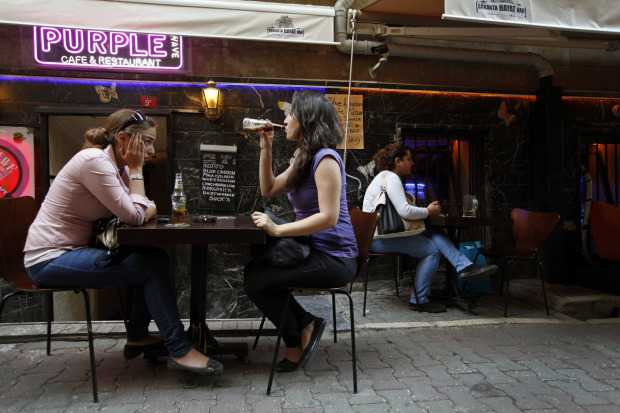graeme smith
ISTANBUL— From Wednesday’s Globe and Mail
Turkish Prime Minister Recep Tayyip Erdogan recently toured the Middle East, touting his government as a new model of Islamism – progressive, modern and tolerant – for a region at a political crossroads.
That kind of talk drives people crazy in the heart of Istanbul’s Beyoglu nightlife district.

Patrons sit outside a bar in Beyoglu, in the heart of Istanbul, where authorities have banned tables and chairs in the street since mid-July.
Charla Jones for The Globe and Mail
Bar and restaurant owners say thousands of workers have lost their jobs after a decision in July that swept patio tables off the streets, and they speculate that the pious Mr. Erdogan may be trying to hide the most visibly hedonistic side of his country at this sensitive moment of outreach to the Arab world.
“We are turning East, politically and economically,” said Tahir Berrakkarasu, director of a local business association. “Today’s administration is against alcohol, basically, because they think it’s immoral.”
Much of the speculation focuses on a visit by the Prime Minister during a religious holiday this summer, which left the bar owner with the uncomfortable feeling that the patio dispute involved more than the usual bickering over municipal rules.
Istanbul still has a more rollicking bar scene than any Canadian city, and Mr. Erdogan has never admitted a role in the squabbles over its regulation. Tables and chairs in pedestrian walkways technically fall under the mandate of the local mayor. Supporters of the Prime Minister argue that the ruckus over patio tables could not have been linked with his foreign policy, or his religious views, by pointing out that the mayor’s men have been playing a cat-and-mouse game with restaurant owners for years.
Local officials set limits on how much of the sidewalk could serve as a seating area for eating and drinking, and establishments merrily thwarted those rules with a mix of bribery, trickery and brazen disobedience. The municipality’s failure to control the tables spilling into the streets gave the old neighbourhoods of Beyoglu a bohemian charm that attracted an estimated 2.6 million visitors on busy summer weekends.
The Prime Minister himself was among the recent visitors, although he wasn’t stopping for a beer. Witnesses saw a convoy of five or six black sedans roll into the neighbourhood on July 15, part of a three-day religious holiday. It’s rumoured that Mr. Erdogan was marking the occasion with a visit to the Galata Mevlevihanesi, an historic hall founded by Sufi Muslims in 1491.
A bar owner, who declined to be identified for fear of retaliation against his business, said he saw the convoy leaving Beyoglu, slowly creeping down a hill. It was a typical Friday afternoon, he said, with patrons jam-packed at small tables that occupied the entire sidewalk, forcing throngs of pedestrians into the cobblestone street. The scene would have reflected the cosmopolitanism of this urban enclave, with local Muslim girls in short skirts often indistinguishable from tourists.
Somebody who appeared to be a bodyguard poked his head out of one of the black sedans and started screaming at people blocking the convoy’s path, the bar owner said. He cast doubt on a widespread rumour that patrons had lifted their beer and wine glasses to salute the Prime Minister, but added that it may have happened when he wasn’t looking.
If one of Mr. Erdogan’s bodyguards did lose his temper, it wouldn’t have been an isolated incident. A United Nations guard was hospitalized with bruised ribs on Sept. 23 after a fight with the Turkish Prime Minister’s entourage.
Nor would it have been unusual for Mr. Erdogan to make policy spontaneously: Last January, upon seeing a pair of concrete statues built in eastern Turkey in the name of peaceful relations between Turkey and Armenia, the Prime Minister reportedly called the sculpture “a monstrosity” and ordered it destroyed.
Whatever the impetus, municipal authorities scrambled to clear away the patios. A series of raids began on July 20, with swarms of security officers removing tables – at times, locals say, while patrons were eating. The head waiter at one restaurant recalled chasing after the trucks that removed his patio furniture; after long negotiations, he obtained a permit to recover the items from a municipal yard, only to discover that the security forces had smashed them.
A similarly crushing response quelled some of the demonstrations that sprang up against what became known as the “Table Operation.” In Galata Square, a teenager played saxophone while his friends sang protest songs; plainclothes security officers shoved their way into the crowd and arrested the ringleaders, amid scuffles.
A local business group, Beyder, says it has collected 30,000 signatures on a petition against the operation. The group estimates that 2,500 staff have lost their jobs, as the dispute drags into its third month, but a quick resolution seems unlikely.
“The problem is bigger than the tables and chairs,” said Aydin Ali Kalayci, an executive member of Beydar, who runs a popular restaurant. “The problem is that the money is flowing now from the Middle East, so they want to make changes in our society. Time is running out for us.”

Leave a Reply